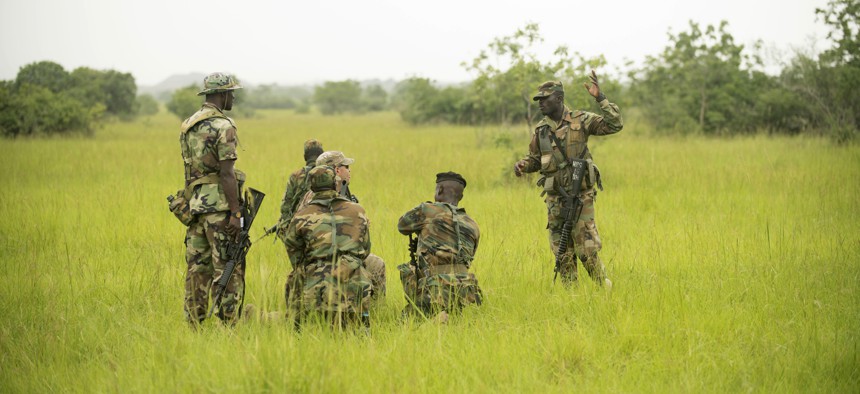
U.S. Army Africa troops train with regional allies during the United Accord 2018 exercise in Accra, Ghana, July 16, 2018. U.S. Army Africa
Trump’s New Africa Plan: Fewer U.S. Troops and Aid, More Investment and Deals
U.S. Army Africa troops train with regional allies during the United Accord 2018 exercise in Accra, Ghana, July 16, 2018.
The Trump administration rolled out a new Africa strategy with a plan that appeared to leave unchanged U.S. counterterrorism activities on the continent while emphasizing increased economic development as the primary means to counter Russian and Chinese influence there.
National Security Advisor John Bolton, in a speech at the conservative Heritage Foundation on Thursday, warned grimly that the West needs to “wake up” to the threat posed by Russia and a “predatory” China, which for decades has used infrastructure investment, political ties and security assistance to expand its influence across the continent.
But he did not announce significant new military assets or changes to the size, location or mission of U.S. troops in Africa to counter that threat. The new strategy calls for countering Chinese influence on the continent through bilateral trade and investment programs, while simultaneously reevaluating foreign aid and assistance programs, including financial support for United Nations peacekeeping missions in countries whose governments oppose American interests at the world body.
Countering threats from terrorist groups on the continent is the “second priority” under the new strategy, in keeping with the Trump administration’s broader National Defense Strategy structured around geopolitical competitors like China and Russia. But thousands of American troops deployed in countries like Niger, Somalia, Mali and Libya are still training, advising, and fighting alongside local security forces, in some places battling extremist fighters with airstrikes and ground operations with local commandos. Bolton said the administration will “assist key African governments in building the capacity of partner forces and security institutions,” which is current policy. The goal, he said, is to build up local security forces so that they can tackle the fight against extremists themselves — also the goal under the Obama administration.
“I thought that the counterterrorism side was one of the least developed [parts of the Trump strategy],” said Judd Devermont, who currently leads the Africa program at the Center for Strategic and International Studies, and who served as the national intelligence officer for Africa from 2015 to 2018.
Trump administration officials at the Defense Department announced last month that they were cutting 10 percent of U.S. troops in Africa over the next several years, including half of the counterterrorism forces operating in West Africa. Some critics argue that the drawdown will allow Russia and China to fill the void left by U.S. troops. Bolton argued Thursday that the U.S. would empower regional security cooperatives like the G5 Sahel Joint Force, made up of troops from Mauritania, Niger, Chad, Burkina Faso and Mali. Reallocating American troops “doesn’t reflect a lack of priority,” he said.
The new strategy reflects the Trump administration’s broad disdain for multilateral engagement and reliance on international organizations, calling instead for “bilateral mechanisms to maintain maximum American control over every American dollar spent.” Bolton described it as “[revisiting] the foundational principles of the Marshall Plan,” which he said approvingly “furthered American interests [and] bypassed the UN.”
It is also part of the broader shift of focus in Trump’s national security leaders from terrorist threats to countering nation-state competitors like Russia and China, or what the Trump administration has termed the return of “great power competition.” Per the administration’s National Defense Strategy, long-term strategic threats from countries like Russia and China take precedence over countering extremist groups like al-Qaeda and ISIS.
While the Pentagon has escalated counterterrorism strikes and special operations missions in U.S. Africa Command’s expanding mission, lawmakers and former officials for years have warned that U.S. objectives have relied too heavily on pockets of elite operators for short-term tactical missions at the expense of a broader strategy.
“Within the U.S. government, Republican and Democratic administrations alike, it’s often been difficult to get people to focus on [Africa],” Bolton said Thursday. “There are always competing priorities.”
The death of four American soldiers in a deadly ambush in Niger last fall inflamed scrutiny on U.S. security operations in West Africa, where the presence of U.S. soldiers, though advertised on AFRICOM’s website, surprised many Americans.
“But now I think precisely because of the very well thought-out and comprehensive intervention of China in a program that is systematically designed to tilt whole regions of the world— particularly mineral resource-rich areas—in China’s direction, that this a very important point for the U.S. and the West as a whole to wake up,” Bolton said.
In a lengthy account of China’s “disturbing” bid for influence in Africa — one that regional policy experts say is accurate — Bolton declared that if Djibouti hands over control of the Doraleh Container Terminal, a Red Sea shipping port, to Chinese state-owned enterprises, "the balance of power in the Horn of Africa, a major artery of maritime trade between Europe, the Middle East, and South Asia, would shift in favor of China.” The port is of particular concern to military brass, who have warned that that China could place restrictions on its use that would limit resupplying of the U.S. base there and the ability of Navy ships to refuel. AFRICOM head Gen. Thomas Waldhauser told Congress earlier this year that the potential handover would carry “significant consequences” and warning that the port was only the first facility on the eastern coast sought by China: “There will be more,” he said. The U.S. maintains a permanent base there, Camp Lemonnier, which is home to more than 4,000 personnel and is used as a jumping-off point for special operations across the continent and in Yemen, across the narrow Bab el-Mandeb strait, as well as a lilypad for attack aircraft and personnel from Navy and Marine Corps ships offshore.
Under Trump’s strategy, Bolton said the U.S. will seek to counter China’s influence by expanding economic relationships with select African countries. The administration will “encourage African leaders to choose high-quality, transparent, inclusive and sustainable foreign investment projects, including those from the United States,” Bolton said. To attract and support U.S. investors, the plan also calls for a new trade program called “Prosper Africa.”
“Part of what we’ve been trying to do is make clear that they way we do business is much more straightforward” than China, Bolton said.
But he offered few details on what was perhaps the most concrete policy proposal in Thursday’s speech, including how it might integrate with existing programs. A bid to increase trade and investment with Sub-Saharan Africa was also part of Obama’s 2012 strategy; and under the so-called Africa Growth and Opportunity Act, or AGOA, some African countries receive trade preferences with the U.S. on the condition they uphold free elections and markets.
The strategy also calls for a harsh re-evaluation of U.S. foreign assistance and aid to Africa. The U.S. is close to completing a review of the foreign aid and is reevaluating its financial support for U.N. peacekeeping missions, Bolton said. He declined to say whether the plan would involve budget cuts or just a reshuffling of assistance to African nations.
“We will make certain that all aid to the region, whether for security, humanitarian, or development needs, advances U.S. interests,” he said. “Countries that repeatedly vote against the United States in international forums, or take action counter to U.S. interests, should not receive generous American foreign aid.”
Although concerns about muscular Chinese influence on Africa are well-founded, Devermont said, the speech’s emphasis on China overshadowed the larger strategy of trade and investment. And he noted that there was no mention of the diplomatic engagement that will almost certainly be needed to promote the economic relationships that Bolton hopes to build with different nations on the continent.
“If we’re drawing down AFRICOM forces, shouldn’t we be plussing up diplomats?” he asked.







